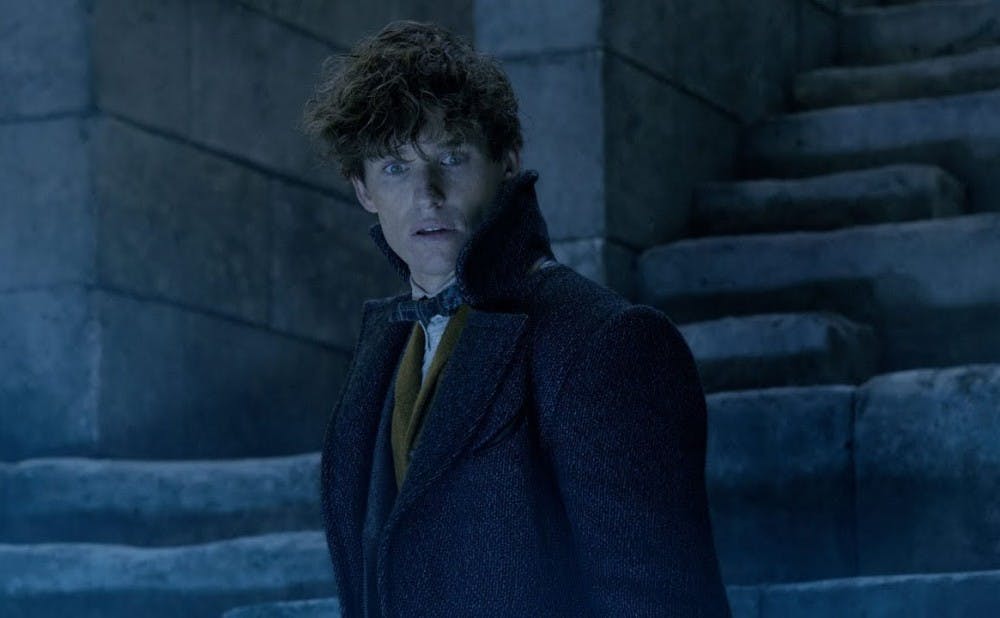"Fantastic Beasts: The Crimes of Grindelwald,” directed by David Yates and written by J.K. Rowling, is the newest edition to the wizarding world franchise and “Fantastic Beasts” saga.
For audiences who fell in love with the original “Harry Potter” series, the film introduces much darker subject matter, more appropriate for older fans. Yates does not shy away from loss and betrayal to the fullest extent. It sacrifices some of the magical elements, like the plethora of creatures in the first film, for the character development that the previous volume was lacking.
The previous film, “Fantastic Beasts and Where to Find Them,” concluded with the Magical Congress of the United States’s capture of the infamous wizard Gellert Grindelwald (Johnny Depp) and the reveal of Credence Barebone (Ezra Miller) as an Obscurial, or a wizard who has had their magic suppressed resulting in immense capabilities. “Crimes of Grindelwald” begins with Gellert Grindelwald’s escape during a prison transfer between New York to London with the help of his loyal henchman Abernathy. Grindelwald hopes to continue his mission for wizard domination by locating Credence and, through manipulating Credence, killing off his only threat and greatest enemy, Albus Dumbledore (Jude Law).
Three months later, in England, Newt Scamander (Eddie Redmayne), an eccentric magical zoologist, is prompted by Dumbledore to retrieve Credence. Dumbledore fears for Credence’s life, as he is threatened both by wizards frightened of his tremendous power and by those who hope to manipulate him. Conflicted by Dumbledore’s demands and his fears of further punishments from the Ministry of Magic, especially after losing his magical international visa from previous crimes, Scamander soon decides to leave with the main intention of following his love Tina Goldstein, an American auror also in pursuit of Credence. As these many groups attempt to capture Credence, each with their own motives, Credence himself struggles with his identity, confused by what he has been told and by his own emotions.
The film centers on themes of identity and heritage and the role these play in an individual’s life. For a world built on distinction between non-magical and magical folk and hierarchical structures to family names within the magic world itself, an individual’s background is so much more than just a name. This strict adherence to bloodlines is evident in the character of Credence, an orphan who, even with limited exposure to these power structures, continually chooses attempts to discover his identity over the morally right action. He spends the entirety of the movie seeking out individuals with any knowledge of who he is and doing whatever it takes to uncover that.
From a historical perspective, this quest for identity alongside Grindelwald’s need for wizard purification seem to point to clear political statement, a statement against complacency in the face of bigotry and in favor of a more accepting world. Grindelwald, a portrayal of fascism in the wizarding world, alludes to Rowling’s perspective on modern politics, with fans concluding Grindelwald is an obvious allusion to Hitler himself. Her protagonist, Newt Scamander, struggles against the darkness since fighting against this oppression requires an active role, a role that requires risks and potential danger. Yet, for Rowling, passivity is acceptance, regardless of intention. Sometimes, though, this message falls short, as Rowling attempts to blur the lines between good and evil, inevitably weakening her argument.
Ultimately, “Fantastic Beasts: The Crimes of Grindelwald” leaves something to be desired. Yates, who also directed the final four Harry Potter movies, and Rowling herself seem to lose track of the series and the many intricacies that built the Potter universe. Plots remain disconnected and characters felt purposelessly introduced. Although it often panders to the nostalgic “Harry Potter” spirit, with favorite characters like the young Albus Dumbledore and classic references to previous movies, the movie lacks necessary cohesion with the series itself. (There are even points where eagle-eyed fans have been able to point out holes in the Potter universe, like the introduction of middle-aged Professor McGonagall, who, according to Rowling’s own Pottermore site, was born in 1935 while the movie itself takes place in 1927.) It was as if the film was only created to make the transition to the third movie, where, hopefully, the many plots will come together. Regardless, the movie is unable to stand alone from the series and is full of lost potential.
Get The Chronicle straight to your inbox
Signup for our weekly newsletter. Cancel at any time.

